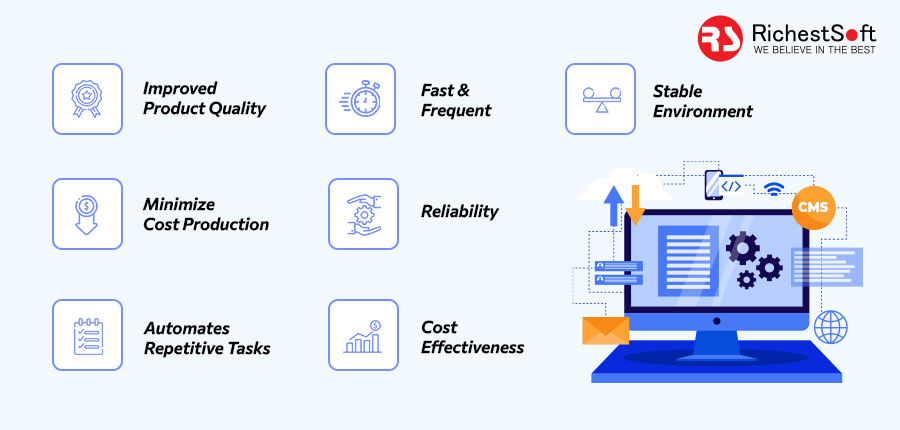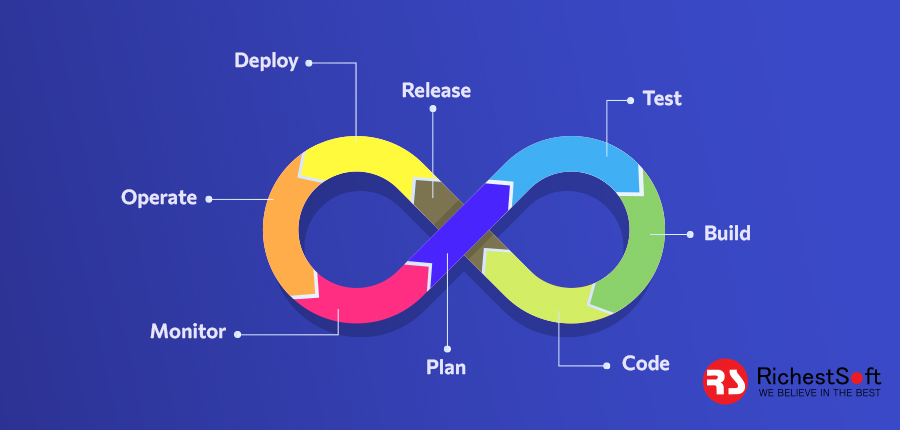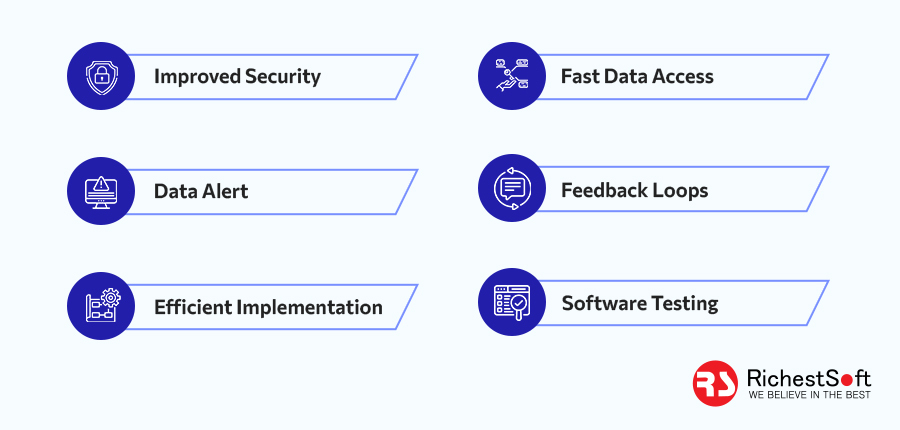Using DevOps for making your AI more effective becomes a hallmark element for enterprises’ growth as it provides flexibility, scalability, high quality, and speed. A report by Gartner predicts that by 2023 Professional DevOps teams will use infrastructure monitoring applications paired with AI.
To power up IT operations in the quest to achieve digital transformation, DevOps teams focus on infrastructure apps that come with integrated artificial intelligence.

Startups that provide AI-based software development apps have increased by $702 million in a single year, According to a Deloitte report.
DevOps is a rising technology that has had significant growth in a few years.
DevOps and Its Benefits
A combination of practices that integrates software development and IT processes. To test, build and release efficient software is possible due to DevOps. DevOps fills out inconsistencies between operations and development by collecting continuous feedback from the process. DevOps is an integration of Dev(developments) and Op (operations).
DevOps is popular for generating a multitude of data. To monitor and streamline various processes and tasks DevOps data is useful. In today’s scenario, teams aren’t able to deal with massive data load and here AI comes into the light.
AI is useful in making calculations and decisions and it is understood by everyone that it is hard to separate digital transformation from computing. AI helps in speeding up production and at the same time, it increases precision. AI helps in saving time and boosting efficiency as it can automate a wide range of business processes. DevOps is hard to separate from artificial intelligence in the future.
It is advantage of AI as a machine that is highly intelligent and vital to understand that once machines are programmed accurately, they start to imitate all the possible human actions for simple and complex tasks.

Here we are going to elaborate on some benefits of DevOps that work as perks for companies for their operational processes:
DevOps gives surety of a stable environment
Productivity standards can be affected by the release of new updates or features. Companies can balance their overall operations and ensure a stable work environment, with the practices of new modern-day DevOps.
Surety of faster and more frequent deployment
DevOps teams are allowed by DevOps to make regular, instant, and fast delivery updates. The establishment of a robust presence in the market for the organization is allowed by DevOps.
Automates Repetitive Tasks
Unlike the traditional model, companies identify the main issues accelerating overall DevOps efficiency with the help of efficiency. DevOps teams get more curious and become more innovative with the innovative idea when automation tests repeated flaws.
Product quality improved by DevOps
collaboration of operation and development teams is developed by DevOps, as a result, it simplifies collecting feedback leads and enhances the overall productivity.
Minimizes cost production
With the help of DevOps, organizations can reduce product and management costs of every department with continuous integration and collaboration.
What is AI?

It is a field of computer science. That is used to develop computer programs and it simulates human intelligence dealing with technology. Having intelligence like humans it can perform complex tasks, such as automatic cars. AI is an intelligence team including applications development such as Machine Language
Influence of AI on DevOps?

Data and scanning are two elements around which production processes revolve. An infinite volume of data at high speed requires AI capabilities. Nowadays, teams need not be burdened with high workloads and also no need to worry about compromising productivity.
Organizations can work with AI and can automate various aspects of the production processes. Increasing efficiency of automation for administration and security aspects. It allows companies to check weak points and avoid potential preaches.
Enterprises can maintain analytically and data-backed decisions effectively and efficiently with AI computing. AI has a positive impact on DevOps, whether it is about efficient progress, software development cycle, quality assurance, or early detection of issues.
AI can be used at scale by DevOps teams via operationalization models and across the production. To increase flexibility and make the digital transformation, DevOps paired ensures that teams are using an accurate AI-based delivery model. Continuous delivery and deployment of models at higher quality, stability, scalability, and speed are supported by
Read Also: 5 Examples Of Artificial Intelligence That Will Change The Web
DevOps Integrated with AI

Applying AI and Optimize DevOps?
Ideally, an organization requires to have a proper roadmap before exploring the transformative results of DevOps and AI. Here are some facts that can help you optimize DevOps with AI.
1. Evaluation of Your Needs
Moving from a traditional to a modern model is a complicated task and when it comes to AI, most enterprises understand the need to move to a new model. So, before moving to the integration of AI and DevOps, you should ensure yourself to assess relevant requirements to make the final transition
2. Effective DevOps Culture – Roll out

After implementing an effective DevOps culture, you can able to develop and collaborate better. Assurance of unified perspective across departments or teams and set specific priorities to ensure AI integration and DevOps works out.
3. Collaboration and Budget Planning
Measure every change and also encourage more collaboration among teams. To ensure easy access to data you should be able to break down silos and encourage more communication. In the same way, the right estimations and then planning your company’s budget are also necessary before adopting an AI model for DevOP, keep in mind the potential expenses of your company you will have to do throughout the integration process.
4. Bring Things to Everyone’s Knowledge
If you want to adopt Ai to optimize DevOps and want to transform a dedicated work environment, you should ensure that all team members and departments Should know of it and are ready to accept and adopt the new model and bid farewell to the traditional tech setup. For example, you can educate your team members by showing demos and telling them how AI optimizes with DevOps.
5. No Need to Automate Everything
You will need to make incremental organizational changes to take full advantage of artificial intelligence and optimize DevOps. You should make changes that have a positive impact. In the end, you want to automate everything in the process but there is no need to do so as it makes your DevOps tasks more complicated. Applying AI and Optimize DevOps?You will need to make incremental organizational changes to take full advantage of artificial intelligence and optimize DevOps. You should make changes that have a positive impact. In the end, you want to automate everything in the process but there is no need to do so as it makes your DevOps tasks more complicated.
6. Focus on High User Satisfaction
AI doesn’t consume more time (in days or weeks) to collect feedback and roll out new updates or changes in the software. Organizations can turn one’s back on the traditional approaches and examine different development phases through Ai to render High satisfaction.
7. Choosing the Right Tools
To ensure improvement of your security parameters and ensure continuous integration and continuous delivery, the use of the right tools is also required along with DevOps with AI.
Issues That AI Helps To Resolve In DevOps

AI has become a vital and indivisible element to resolve DevOps complexities. As an advanced technology AI comes into the light with having the quality of highly efficient and mitigating operational issues of DevOps. Here are some points that will help you to understand how AI helps DevOps to resolve its issues
1. Improved security
To identify, address and manage security risks, DevOps teams use innovative and creative methods with artificial intelligence.
2. Software testing
Different types of testing such as regression testing, functional testing, and user acceptance testing are used by DevOps teams. With the help of artificial intelligence, DevOps teams can able to identify specific patterns. To ensure the right coding practices and spot errors it collects the relevant data. DevOps teams can use AI-based data to improve efficiency. So basically AI improves the software testing and development process for DevOps teams.
3. Fast data access
AI helps teams to arrange and analyze data to get the big picture. With the help of AI and machine learning, the accessibility of data becomes more flexible. DevOps teams are able to compile and test data from various sources with the help of AI.
4. Efficient implementation
AI requires minimal or no human intervention, which helps in saving time and drives more innovation. Whereas, in the DevOps space it takes human intelligence to manage a dedicated environment.
5. Feedback Loop
The fundamental function of DevOps is to collect data from various but with machine learning monitoring tools, DevOps can take advantage of features like log files, performance matrix, datasheet, etc. DevOps can use these suggestions and use them for various purposes.
6. Dedicated alerts
With AI and machine learning, teams can give priority to dedicated alerts using alert sources, past behavior, and alert intensity. On the other hand, DevOps creates a list of alerts without priority tags which becomes very difficult for the team to process all alerts.
Will DevOps Be Replaced By AI?
Undoubtedly, AI supports enterprises in various forms such as by providing improved service personalization, data protection, and customer interaction. According to a GitLab survey, over 4300 managers and developers there believe that some companies can release their code 10* times faster and up to 80%of respondents admit that releasing code is faster through AI integration.
AI-based tools allow DevOps teams more freedom to make better decisions and resolve technical errors if they share trusted tools. But still, AI and DevOps are in the early stages and not advanced enough that they can replace DevOps entirely anytime sooner.
A combination of DevOps and AI is the ideal way to code, test, and compile software efficiently. AI helps DevOps in stepping up the automation game. Among DevOps AI can spot and resolve problems more quickly and encourage more collaboration and productivity.
So we can say that organizations need to view DevOps (which can become automated in the coming years) as the start of a business-centric journey. DevOps teams require Ai more than ever to manage complex data as the IT environment becomes more automated. Enterprises can expect that in the next five years AI-based DevOps can approach. This transformation will radically influence human transformation and IT operations.
Conclusion
It is always difficult for humans to deal with a large amount of data efficiently and effectively. For solving this Integration of DevOps and AI is the best option as AI speeds up the development tasks and data preparation and achieves scalability. And the good news is that a number of companies started to adapt and embrace AI. But DevOps can use valuable AI to analyze development tasks and deployment processes. But it is necessary to view DevOps and AI one by one by organizations before artificial intelligence can transform DevOps. DevOps has a bright future and AI is at the Centre of it. but when we talk about AI operationalization, there is still room to address complex issues and raise more awareness.
 +1 315 210 4488
+1 315 210 4488 +91 798 618 8377
+91 798 618 8377


